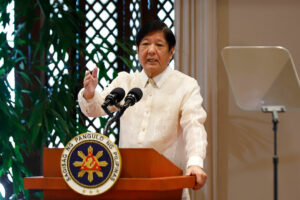
Marcos cites growing security threat from China
THE THREAT from China’s expansive claims in the South China Sea is growing, Philippine President Ferdinand R. Marcos, Jr. said on Tuesday, adding that his country must do more to defend its territory.
“Since the threat has grown, we must do more to defend our territory,” he told Bloomberg TV. “Perhaps, that’s what people are seeing — a more robust defense of our territorial rights as recognized by the international community, through international law.”
Mr. Marcos said heightened tensions at sea do not serve any purpose, adding that his government always thinks about peace for the national interest.
“We want to do everything we possibly can together with our partners and our allies to avoid that situation,” he said, referring to war with China.
“We would like to take a step back from that question; that is precisely what we want to avoid,” he added when asked about US commitment to defend the Philippines from an armed attack in the South China Sea under their 1951 Mutual Defense Treaty.
“This is not poking the bear, as it were. We are trying to do quite the opposite. We are trying to keep things at a manageable level, to continue the dialogues, whatever they are, at every level,” he added.
US Secretary of State Antony Blinken during a visit to Manila on Tuesday said US-Philippine ties are “more than rock solid” and an “absolute priority” of the Biden administration.
“I think [Foreign Affairs] Secretary [Enrique Manalo] said it so well: Our relationship is [on a] hyperdrive,” he told Mr. Marcos in a meeting at the presidential palace, based on a press pool video. “That is so true, we see it across every domain.”
Earlier in the day, Mr. Blinken said the United States stands by its “ironclad” commitments to defend the Philippines against an armed attack in the South China Sea.
“These waterways are critical to the Philippines, to its security, to its economy, but they’re also critical to the interests of the region, the United States and the world,” he said at a joint press conference in Manila with his Philippine counterpart.
Mr. Blinken said the 1951 Mutual Defense Treaty between the two nations extended to armed attacks on the Philippine armed forces, public vessels and aircraft, including those of its coast guard anywhere in the South China Sea.
He said defense ties with the Philippines were “extraordinary” and would only grow further, though Washington’s expanding alliances were not aimed at China.
Mr. Blinken said China’s actions in the South China Sea had triggered a wider international reaction, and the United States was engaged in intense diplomacy to reaffirm international law.
‘NOT POKING’
Mr. Marcos said it is dangerous to think of the US as a “big brother” that the Philippines could always run to when there is a problem.
“That’s not the way we treat it at all,” he said. “We do this for ourselves. We do this because we feel that we have to do it. And it’s not at the behest of the United States.”
“This is an affirmation of the new-found confidence of Manila and to shy away from its ‘victim card’ consciousness,” Chester B. Cabalza, founder of Manila-based International Development and Security Cooperation, said in a Facebook Messenger chat.
He added that the Philippine-US alliance mas matured and evolved. “Manila is more confident now to step up as a co-equal as it seriously enters a trilateral partnership with stronger militaries of the US and Japan.”
“We are not poking and we never have poked the bear,” Don McLain Gill, who teaches foreign relations at De La Salle University in Manila, said in a Messenger chat. “It is in fact the bear that’s poking us.”
He said the Philippines keeps “a mature and moral outlook” in dealing with China by engaging with its allies based on international law. “The Philippines is merely defending what is rightfully its own. Manila is not interested in provoking the established order. We still keep diplomatic lines of communication open with China in case it would be interested to act like a responsible neighbor.”
The Chinese Embassy in Manila on Wednesday said the US should stop stirring up trouble by taking sides in the sea dispute between China and the Philippines.
“China urges the US not to instigate trouble in the South China Sea or take sides on the South China Sea issue,” it said in a statement posted on its website.
“We firmly oppose the groundless accusations made by Secretary Blinken about China’s legitimate and lawful actions in the South China Sea and his thinly veiled threat to invoke the so-called Mutual Defense Treaty obligations,” it added.
It said it was not China that had provoked the tense situation in the South China Sea. “China was made to take necessary steps to safeguard its territorial sovereignty and maritime rights and interests in face of infringement of our rights and interests and provocation.”
The embassy said freedom of navigation in the South China Sea has never been an issue. It accused the US of “seeking freedom of rampage of its warships in the region” as a pretext of safeguarding navigation freedom. “It is exactly the US and not anyone else that’s threatening peace and stability in the South China Sea.”
It also said the US is not a party to the South China Sea issue and has no right to interfere in the dispute between China and the Philippines.
“The recent tension in the South China Sea would not have occurred without the US egging on the Philippines,” it added. — Norman P. Aquino and John Victor D. Ordonez



